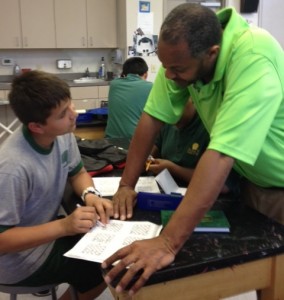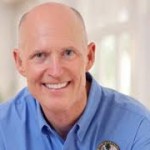 Teacher pay: School districts should stop paying teachers by a rigid formula that is calculated solely by degree obtained and experience, Rep. Manny Diaz, R-Hialeah, tells a group of charter school leaders. “They’re treated in a fashion as if they were labor workers in a technical industry," says Diaz. "They’re not. They’re professionals.” He says pay considerations should take into account classroom skills and field of expertise. Otherwise, he warns, good teachers will continue to pursue administrative jobs to raise their salaries. redefinED.
Teacher pay: School districts should stop paying teachers by a rigid formula that is calculated solely by degree obtained and experience, Rep. Manny Diaz, R-Hialeah, tells a group of charter school leaders. “They’re treated in a fashion as if they were labor workers in a technical industry," says Diaz. "They’re not. They’re professionals.” He says pay considerations should take into account classroom skills and field of expertise. Otherwise, he warns, good teachers will continue to pursue administrative jobs to raise their salaries. redefinED.
Education choices: Advocates of charter schools and public schools find little to agree about in a forum sponsored by the Tampa Tiger Bay Club. Public schools advocates say funding is being diverted to charter and private schools that aren't required to meet the same standards as public schools. "When systems are set up that are unequal and have different sets of accountability, in a way that the competition isn't fair, that's what brings out the negativity," says Melissa Erickson of the Alliance for Public Schools. Charter and private school supporters say choice must be necessary, since it's popular with parents. "It should be a matter of great public policy to provide every alternative possible," says Lincoln Tamayo, head of school at Academy Prep Center of Tampa. Tampa Bay Times. Florida Politics.
Hostile workplace? Two black Pinellas Park Middle School teachers request transfers, saying their workplace has become "hostile and racially charged." The two were among nine minority teachers who started an after-school tutoring program that specifically aimed to help minority students improve their reading, but was open to all students. A letter to the district from NAACP officials claims those teachers were harassed and accused of being racists because they didn't do the program for white students too. Tampa Bay Times. Bay News 9.
Blaming abuse victims: The Palm Beach County School District isn't the only one that's used a "blame the victim" legal defense in lawsuits involving sex abuse of students by district employees. A review of public records shows that attorneys for the Broward and Miami-Dade school districts have also claimed in court that abused students were "negligent" or "culpable." Sun-Sentinel.

Young talks strategy with seventh-grader Jonathan Munoz during class recently. Jonathan, 13, won first place at the recent state scholastic chess tournament. Photo by Sherri Ackerman
When fifth graders enroll at Tampa's Academy Prep Center, they usually haven't played chess before.
But they learn quickly, as a group of sixth- and seventh- graders showed when they traveled to a state chess tournament in Miami last weekend, and came home with a win.
They took the top two spots in their division, and four out of the top 10 in a field of about 50 students. The five students who entered in the K-8 Under-900 division all placed in the top 20, and their team brought home the state trophy (find the full results here).
Their private school caters exclusively to low-income students. It teaches all of them chess.
Michael Young, who teaches Academy Prep's chess classes and coaches its teams, said learning the game can help students develop important skills: Focus, patience, pattern recognition, creative problem-solving.
It can also give them a chance to travel to other cities and compete with more affluent peers. The students who competed in the Florida State Scholastic chess Championship hadn't been exposed to the game before they arrived at the school. (more…)
David Colburn is a respected former University of Florida provost and progressive academic who should have done more homework before he blithely characterized those who support private school options as salesmen and hucksters. His recent commentary in the state’s largest newspaper, the Tampa Bay Times, rather pointedly ignored important evidence in his own backyard.
Dr. Colburn is good thinker on education issues, but somehow managed to treat all school vouchers as though they are inherently unaccountable. “There is something basically wrong when public funds are earmarked for these private schools,” he wrote, “and the state fails to insist on accountability measures for student achievement outcomes.”
That assumption is demonstrably false, and he need look no farther than his own state. The state’s first voucher program, which was declared unconstitutional in 2006, required students to take the state test. The current pre-K voucher that served 145,551 4-year-olds last year requires pre- and post-academic evaluations that are used to rate providers.
Lincoln Tamayo, who runs the highly successful Academy Prep Centers of Tampa and St. Petersburg that serve underprivileged middle school students, was also quick to note in a letter to the editor that the Florida Tax Credit Scholarship serving 49,000 low-income students has required nationally norm-referenced tests since 2006. The test scores for Tamayo’s students, who are treated to an intensive six-day-a-week, 11-months-a-year program, reveal both year-to-year academic gains and 8th grade reading and math scores in the 70th and 76th percentile range.
There is ample room for principled debate over whether the current testing approach for these private options is sufficient to assure that students are making academic progress. For example, there are certainly challenges in trying to compare the test results of low-income students in private schools with their low-income colleagues remaining in public schools, in part because the scholarship students tend to be much poorer.
But Dr. Colburn instead seemed content to assert that vouchers “court disaster,” as though every one of these programs is flying blind. His lack of intellectual rigor was, needless to say, disappointing.
 Rick Scott’s ed plans. Charter school expansion is a plank in Gov. Scott’s education plan for the next legislative session, but this exclusive Tampa Bay Times story on it doesn’t offer much detail. Here’s the main part that touches on school choice: The plan includes “lifting enrollment caps on charter schools, removing barriers to choice options in low-performing areas and letting school districts operate their own "charter innovation schools. ‘Our local school districts are going to keep getting better if we give them the authority to do it,’ Scott said.”
Rick Scott’s ed plans. Charter school expansion is a plank in Gov. Scott’s education plan for the next legislative session, but this exclusive Tampa Bay Times story on it doesn’t offer much detail. Here’s the main part that touches on school choice: The plan includes “lifting enrollment caps on charter schools, removing barriers to choice options in low-performing areas and letting school districts operate their own "charter innovation schools. ‘Our local school districts are going to keep getting better if we give them the authority to do it,’ Scott said.”
School grades work. In this op-ed for The Oklahoman, former Florida education commissioner Eric J. Smith gives Oklahoma kudos for adopting a school grading system. It worked in the Sunshine State, he said, particularly for the kids who needed the most help: “The biggest winners in Florida have been low-income, minority students. Schools that had long failed these students were exposed. Parents were given options to move their children to other schools. And when that happened, poorly performing schools could no longer be ignored or tolerated.”
Op-ed got it wrong on vouchers. Lincoln Tamayo, who heads the highly regarded Academy Prep private schools in Tampa and St. Petersburg, writes in response to a recent op-ed in the Tampa Bay Times that suggested vouchers don’t come with enough accountability.
Florida Virtual School in Education Week. In a story about blended learning. You’ll need a subscription to see the whole thing, but here’s a taste: “Forty-four districts in Florida have now put in place FLVS hybrid or blended learning models, called Virtual Learning Labs, said Tania Clow, a spokeswoman for the FLVS. The virtual school launched the blended programs during the 2010-11 school year, with 152 Virtual Learning Labs across the state. The number has grown this school year to 314, Ms. Clow said. Face-to-face interaction includes the weekly teacher visits, the facilitator, and frequent visits from an FLVS specialist in blended learning who troubleshoots school issues.”